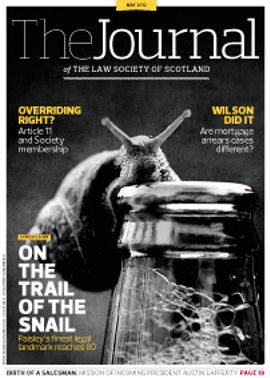Opinion column: Fraser Tait

“Ch-ch-ch-changes: turn and face the strain.” David Bowie’s song could be the profession’s anthem. Change for the sake of change is pointless. Change, for the Law Society of Scotland and its members, can open up opportunities, create better value for money and encourage more than financial investment in our profession.
Notwithstanding the failings of its large institutions, we live in a capitalist society, at the core of which is freedom of choice and the encouragement of competition. In recent years, the Society has been at the forefront of encouraging such freedom of choice, through ABS and opening up the profession to non-lawyers such as licensed practitioners and registered paralegals.
It is therefore difficult to maintain a case for denying lawyers the choice of a representative organisation, rather than being compelled to join the Society.
Since its inception, the Society has worked with an obvious conflict of interest, seeking both to represent its members and protect the public. In past days, this may not have been quite the conflict it currently is in a very consumer-oriented world. The arrival of the Scottish Legal Complaints Commission should leave the Society as a regulator and representer of its members. Unfortunately, the perception of many members is that the Society is more of a regulator than a representative.
That in itself is not necessarily a bad thing. However, the cost of maintaining it has become punitive in relation to decreasing revenues. Further, the way regulation is imposed, in general, leaves an impression of the Society not being as helpful as a representative body ought to be. I am aware of at least two cases where solicitors have sought help when encountering difficulty, through no fault of their own, and been advised that the only help which could be offered was the appointment of a judicial factor.
Given the lack of choice and perception of the way in which the Society exercises its functions, the time has come for solicitors to be given a choice of whether or not to join the Society.
The Society should remain as a regulator, but would not be entitled to charge the vast sums it currently does. I was astounded recently to discover that the Society’s annual budget is in the region of £10,000,000. If the Society has 10,000 members, that is a cost to each solicitor of approximately £1,000 per annum.
Its functions are less than they were five years ago and members struggle to see value for their subscriptions. The profession will always need to be regulated. Indeed, this is one of our main selling points – that we operate to very high standards of professional conduct and service. Regulation is needed to ensure the public can have confidence in the profession. The Society should, however, be able to operate at a far lower budget.
With the Society’s function solely regulatory, lawyers would be free to choose whether to join a representative body such as the Scottish Law Agents Society, Glasgow Bar Association, Legal Defence Union or similar. In the current climate, there should be a market for other representative bodies. As a solicitor who has never operated in Edinburgh or Glasgow and has spent a large part of his career in the Highlands, islands and north east, there is a perception that the Society, in common with many organisations and Government departments, is Edinburgh-centric.
Given the Society’s reduced mandate, the Council should be radically reshaped. Members are being appointed to Council without any election due to the lack of interest in joining. Currently 11 of 13 vacancies have been filled without an election. There may be many reasons for this, but I suggest two main ones: people are too busy trying to keep their heads above water, and there is a perception that little can be done to effect real change, even at Council level. Mike Dailly of Govan Law Centre has suggested that two representatives from each sheriffdom be chosen to represent the profession at Council. In the modern world, this seems a reasonable, practicable solution. If this generates the need for elections, that may stimulate interest in the work of the Society.
In summary, it is time for change. Solicitors should be able to opt out of membership of the Society, although the Society would need to retain a regulatory role. That role is one which is capable of being performed more cheaply and efficiently than at present. This pared-down Society would be leaner and meaner. That would leave solicitors free to decide whether to join a representative body. Such freedom of choice would ensure that representative bodies genuinely reflect the views and needs of their members. We could then perhaps look forward to some Golden Years before death or retiral (whichever comes first).
In this issue
- Arguments in store
- Farming the constitution
- Willing to wound, yet afraid to strike?
- Deferred consideration – worth the paper?
- OSCR: the secondees' perspective
- To efficiency and beyond
- Reading for pleasure
- Opinion column: Fraser Tait
- Council profile
- Book reviews
- President's column
- Wind farms: a challenge to registration
- Snail of the century
- Rights both ways
- Sell, sell, sell
- RBS v Wilson: light in the tunnel?
- Take the heat out
- Prepare for case management
- Looking into the past
- Migrant days numbered
- CPI - the story so far
- Brighton declares
- Mary Mary quite contrary?
- How to avoid that Guarantee Fund interview, and worse...
- Law reform roundup
- Apportionment of price for SDLT
- Business checklist
- Practical guide to legal risks
- Ask Ash






